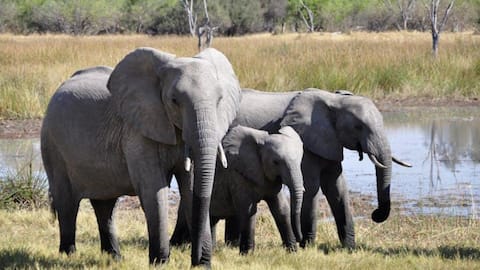Elephants use individual names for communication, study finds
What's the story
A recent study has revealed that elephants communicate using individual names they create for each other. This groundbreaking discovery, made by an international team of researchers, shows that unlike dolphins and parrots who mimic sounds, elephants are the first non-human animals known to use non-imitative names. The research was conducted by analyzing the calls of two wild herds of African savanna elephants in Kenya using an artificial intelligence algorithm.
Unique vocalizations
Elephants recognize and respond to individual calls
According to The Guardian, Michael Pardo, a behavioral ecologist at Colorado State University, observes that elephants use specific vocalizations for each individual. They are capable of recognizing calls intended for them while ignoring those addressed to others. The research team analyzed elephant "rumbles" recorded in Kenya between 1986 and 2022 using a machine learning algorithm. They identified 469 distinct calls involving 101 elephants issuing a call and 117 receiving one, demonstrating the wide range of sounds elephants make.
Naming practice
Elephants use names mostly when addressing young
The study found that names were not always used in elephant calls but were often used over long distances when adults addressed young elephants. It was more common for adult elephants to use names than calves, suggesting that learning this skill could take years. The most frequent call was described as "a harmonically rich, low-frequency sound" in the study published in Nature Ecology & Evolution.
Emotional response
Elephants respond positively to familiar names, researchers observe
When researchers played a recording of an elephant's friend or family member calling out their name, the animal responded positively and "energetically". However, the same elephant was less enthusiastic when hearing the names of others. The study suggests that elephants and humans are the only two animals known to invent "arbitrary" names for each other. Senior study author George Wittemyer noted that this indicates elephants have the ability for abstract thought.
Future studies
Further research needed on evolutionary origin of elephant communication
The researchers have called for more studies into the evolutionary origin of this unique talent for name-calling in elephants. This call comes as the ancestors of elephants diverged from primates and cetaceans about 90 million years ago. According to Frank Pope, CEO of Save the Elephants, humans and elephants have many similarities, including living in extended family units with complex social interactions, supported by advanced brains.
